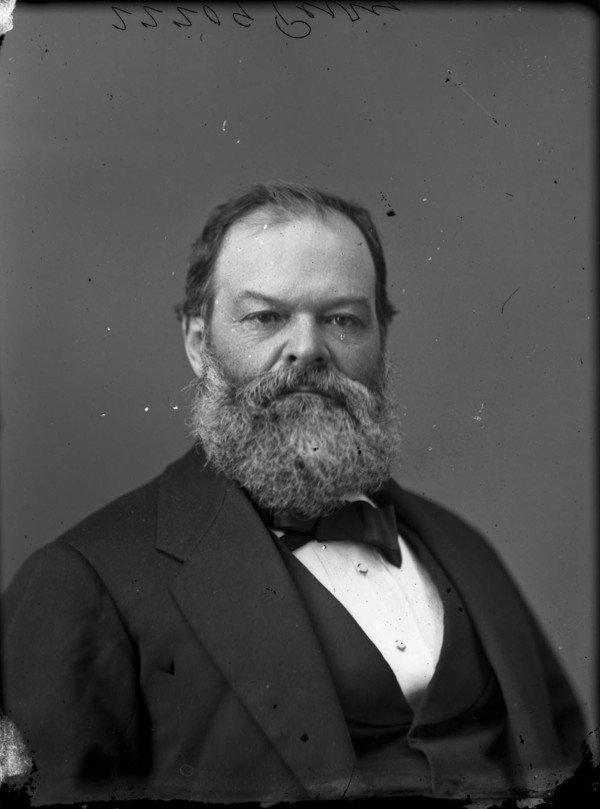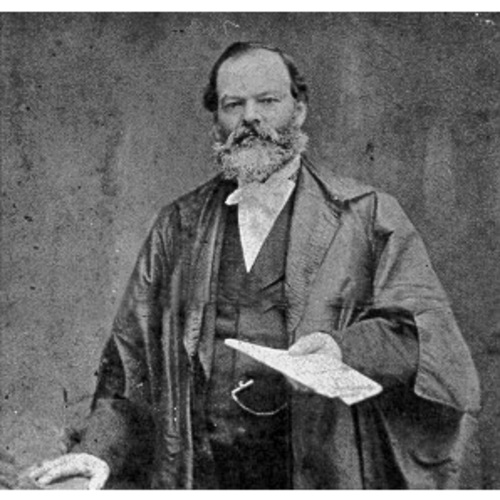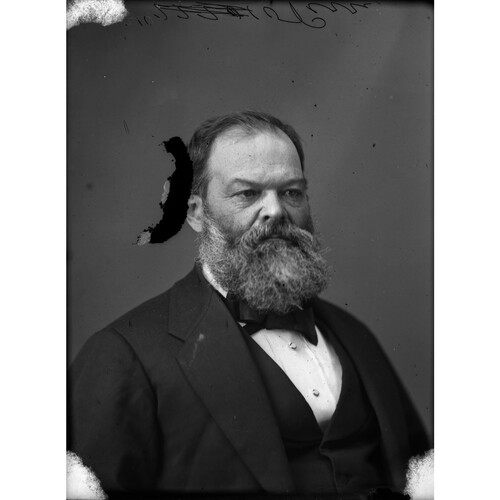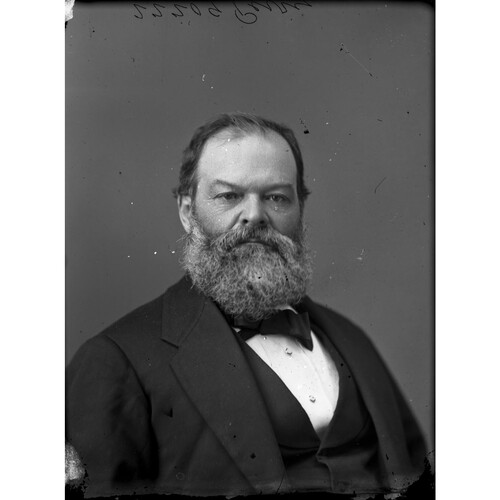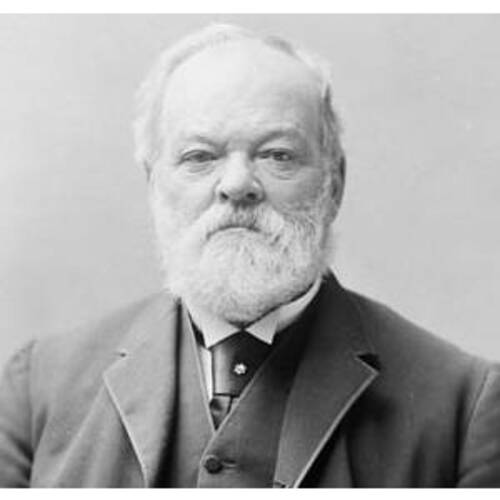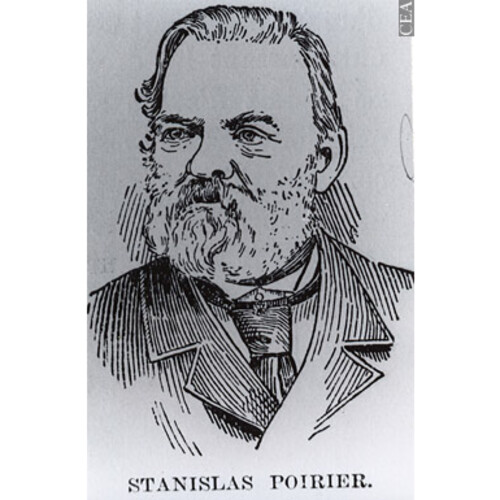PERRY, STANISLAUS FRANCIS (Stanislas-François Poirier), teacher,
Stanislas-François Poirier first attended the elementary school in Tignish, and then had three years of English-language schooling at St Andrew’s College, an institution established and run by the Roman Catholic diocese of Charlottetown, where he mastered English. In 1843 he began teaching in Tignish. The following year he became one of the Island’s first Acadians to receive a first-class teaching certificate from the Board of Education. Around that time, in order to become better integrated into the largely anglophone Island society and “to avoid the attacks” being directed against Acadians, he anglicized his name, as had his uncle, Abbé Sylvain-Éphrem Perrey*. In 1851 he was appointed a justice of the peace.
Perry left teaching in 1854 to enter politics. As a man of modest means (he would be reminded of his “poverty” by his political opponents during electoral campaigns), he took up farming in Tignish soon thereafter to support his large family. During the next 43 years he ran in 13 provincial and 8 federal elections, all in Prince County, meeting defeat three times provincially and four times federally. He was the first Acadian to hold a seat in both the Island’s assembly and the House of Commons.
Perry was first elected in 1854 for Prince County, 2nd District, under the banner of the liberal party, led by George Coles*. The party’s objective was to wrest the Island from the large proprietors to permit tenant farmers, who numbered in the thousands, to own the lands they worked and shake off the economic yoke of the landowners and their agents. Because many of these tenants were Acadians, Perry naturally embraced this cause and the party upholding it. However, in August 1870, following the example of most of the Roman Catholic liberal mhas, and of Peter McIntyre, the Catholic bishop of Charlottetown, Perry left Robert Poore Haythorne’s governing liberal party to help form a coalition government with the conservatives, led by James Colledge Pope*. The dissidents were frustrated with a predominantly Protestant government which was refusing to make grants to Catholic schools. The conservatives, for their part, proclaimed themselves in favour of such subsidies. In the spring of 1873, under the coalition government, Perry was appointed speaker of the house, a post he held until 1874. His appointment was partly attributable to the government’s desire to please the Acadian community, which was complaining about its exclusion from political appointments even though Acadians, through the participation of their two members, Perry and Joseph-Octave Arsenault, had been instrumental in forming the coalition government.
When Islanders were debating whether to join confederation, Perry was initially opposed to the idea. During the election campaign of February 1867 he loftily proclaimed that he would not grant strangers the power to tax Islanders, and even declared that he would leave the Island if it were annexed to Canada! His extremely hostile attitude did not last long after the Island joined confederation in July 1873. In the province’s first federal elections, held in September, Perry ran as a Liberal for Prince County but did not win. However, he was successful in the general election of 1874, which was won by Alexander Mackenzie’s Liberals. Defeated in 1878, he sat in the provincial assembly from 1879 to 1887, and then in the House of Commons from 1887 to 1896 and again from 1897 until his death.
Perry had a long but undistinguished political career. At the provincial level he served as speaker but, contrary to some accounts, there is no evidence he ever sat on the Executive Council. For several years he spoke out in the commons for the construction of a tunnel to link the Island to the mainland, an issue raised many times by the Island’s representatives in Ottawa, and especially by Senator George William Howlan*. A journalist described Perry’s speeches as articulate and rousing and noted, “There is, perhaps, no member of the house better informed about the needs of his county.” However, he went on, “For a fervent Liberal in politics, he is very conservative regarding the interests of his constituents.”
Perry’s victories in numerous elections were largely due to the Acadian vote. Even so, he seldom championed the Acadian cause, in particular French-language education. For this reason Acadian nationalists, most of whom were Conservatives, often made his life difficult, accusing him of invoking patriotism only during elections, and then only to gain his compatriots’ favour. They did not, for example, easily forgive him for boycotting the important Acadian national convention of 1884, held at Miscouche, P.E.I., and, above all, for having encouraged his constituents to do so as well. Perry had been offended because although he was a member of the convention’s organizing committee he had not been consulted on the choice of a location and he very much wanted to hold the event in Tignish. Politics doubtless played a role in the affair, for leading committee members, such as Pierre-Amand Landry*, Pascal Poirier*, and Arsenault, were Perry’s political adversaries.
Perry’s defeat in the June 1896 federal elections was partly because he was subjected to vicious attacks by the Acadian and Catholic press. He was branded as unpatriotic for failing to support the cause of French and Catholic schools in Manitoba; he had voted with his party against remedial legislation introduced in March by Sir Mackenzie Bowell*’s Conservatives. But his ostracism was short-lived. In a by-election of April 1897 Perry was returned to parliament and rejoined the Liberals who, under Wilfrid Laurier*, had come back to power in 1896.
Stanislaus Francis Perry died in the nation’s capital in 1898 after a brief illness. The first Acadian from Prince Edward Island to play a role in politics both provincially and federally, he none the less earned but scant praise from the press at the time of his death. Nor was the House of Commons lavish in its tributes. Among other traits, his loyalty to the Liberal party was emphasized as was his devotion to his public responsibilities.
CEA, Fonds Placide Gaudet, 1.64-19 (Perry à Gaudet, 22 déc. 1887). P.E.I., House of Assembly, Journal, 1840–86. Acadian Recorder, 26 Feb. 1898. Daily Examiner (Charlottetown), 23 March 1878, 15 Aug. 1882, 1 April 1892, 1 March 1898. L’Événement 25 févr. 1898. Examiner (Charlottetown), 9 Feb. 1863; 20 March, 10 April, May–July 1871; 18 March 1872; 9 March 1874. L’Impartial (Tignish, Î.-P.-É.), 23 mai 1895; 2, 16 avril, 6, 21, 28 mai 1896; 3 mars 1898. Le Moniteur acadien (Shédiac, N.-B.), 16 mars 1876; 10 janv., 14 mars, 11 avril, 18 juill., 23 août, 12 sept. 1878; 22 mars, 1er, 5, 22 avril 1887; 3 mai 1888; 20 mai 1890; 1er, 8, 28 mars 1898. Star (Montreal), 24 Feb. 1898. Summerside Journal (Summerside, P.E.I.), 21 Feb. 1867; 7, 14 July 1870; 30 Oct. 1873. Weekly Examiner and Island Argus (Charlottetown), 12 July, 23 Aug., 6 Sept., 8 Nov. 1878; 4 Aug. 1882; 23 March 1883. Canadian directory of parl. (Johnson). CPC, 1874, 1877, 1887, 1891. J.-H. Blanchard, The Acadians of Prince Edward Island, 1720–1964 (Charlottetown, 1964); Acadiens de l’Île-du-Prince-Édouard ([Charlottetown], 1956). Conventions nationales des Acadiens, Recueil des travaux et deliberations des six premières conventions, F.-J. Robidoux, compil. (Shédiac, 1907). Georges Arsenault, “Le dilemme des Acadiens de l’Île-du-Prince-Édouard au 19e siècle,” Acadiensis (Fredericton), 14 (1984–85), no.2: 29–45.
Cite This Article
Georges Arsenault, “PERRY, STANISLAUS FRANCIS (Stanislas-François Poirier),” in Dictionary of Canadian Biography, vol. 12, University of Toronto/Université Laval, 2003–, accessed April 29, 2025, https://www.biographi.ca/en/bio/perry_stanislaus_francis_12E.html.
The citation above shows the format for footnotes and endnotes according to the Chicago manual of style (16th edition). Information to be used in other citation formats:
| Permalink: | https://www.biographi.ca/en/bio/perry_stanislaus_francis_12E.html |
| Author of Article: | Georges Arsenault |
| Title of Article: | PERRY, STANISLAUS FRANCIS (Stanislas-François Poirier) |
| Publication Name: | Dictionary of Canadian Biography, vol. 12 |
| Publisher: | University of Toronto/Université Laval |
| Year of revision: | 1990 |
| Access Date: | April 29, 2025 |


